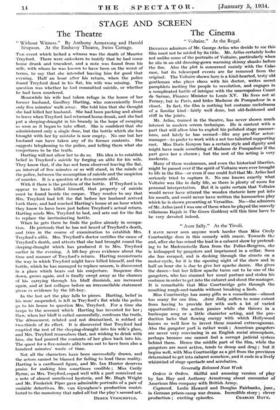STAGE AND SCREEN The Theatre
"Without Witness." By Anthony Armstrong and Harold Simpson. At the Embassy Theatre, Swiss Cottage.
TLIE event which lacked a witness was the death of Maurice Treyford. There were onlookers to testify that he had come
home drunk and truculent, and a note was found from his wife, with whom he was known to have been on the worst of terms, to say that she intended leaving him for good that evening. Half an hour after his return, when the police found Treyford dead in his flat, his wife was missing. The question was whether he had committed suicide, or whether he had been murdered.
Meanwhile his wife had taken refuge in the house of her former husband, Geoffrey Harting, who conveniently lived only five minutes' walk away. She told him that she thought she had killed her husband. She had been packing and about to leave when Treyford had returned home drunk, and she had put a sleeping-draught in his brandy in the hope of escaping
RS soon as it began to take effect. She is confident that she administered only a single dose, but the bottle which she has
brought with her by mistake is now empty. No one but her husband can have taken any of its former contents. She suggests telephoning to the police, and telling them what she conjectures to be the truth.
Harting will not allow her to do so. His idea is to establish belief in Treyford's suicide by forging an alibi for his wife. They know that, if she has not been observed leaving the flat, an interval of five minutes or so will stand, in the minds of the police, between the assumption of suicide and the suspicion of murder. It is a question of a five-minute alibi.
With it there is the problem of the bottle. If Treyford is to appear to have killed himself, that property of suicide must be found beside the corpse. They resolve to say that Mrs. Treyford had left the flat before her husband arrived back there, and had reached Harting's house at an hour which they know to have been just before Treyford's actual return. Harting sends Mrs. Treyford to bed, and sets out for the flat to replace the incriminating bottle.
When he gets there he finds the police already in occupa- tion. He pretends that he has not heard of Treyford's death, and tries in the course of examination to establish Mrs. Treyford's alibi. Mrs. Treyford's doctor certifies the cause of Treyford's death, and attests that she had brought round the sleeping-draught which has produced it to Mrs. Treyford earlier in the evening. A lift-boy gives evidence about the time and manner of Treyford's return. Harting reconstructs the way in which Treyford might have killed himself, and the bottle, which he has managed to replace unseen, is discovered in a place which bears out his conjecture. Suspense dies down, grows again, and is finally swept away as the chances of his carrying through his bluff diminish, are increased again, and at last collapse before an irreconcilable statement given ill evidence by the lift-boy.
In the last act the play falls to pieces. Harting, belief in his wore suspended, is left in Treyford's flat while the police go to his house to question Mrs. Trey ford. For a time she keeps to the account which Harting has invented for her ; then, when her bluff is called successfully, confesses the truth. The denouement, related and not dramatized, is robbed of two-thirds of its effect. It is discovered that Treyford had emptied the rest of the sleeping-draught into his wife's glass, and Mrs. Treyford remembers that, not wishing to drink with him, she had poured the contents of her glass back into his. The quest for a five-minute alibi turns out to have been also a hundred minutes' waste of time.
Not all the characters have been successfully drawn, and the actors cannot be blamed for failing to lend them reality. Harting is a cardboard figure, and Mr. Ian Hunter deserves praise for making him sometimes credible ; Miss Cecily Byrne, as Mrs. Treyford, coped well with a part conceived on a note of almost unrelieved hysteria, and Mr. Hugh Wright and Mr. Frederick Piper gave admirable portraits of a pair of amiable detectives. Mr. van Gyseghem's production contri- buted to the monotony that ruled all but the play's second act.
DEREK VERSCIIOTLE.






































 Previous page
Previous page